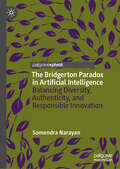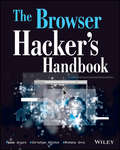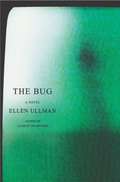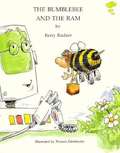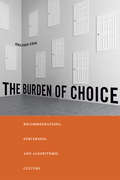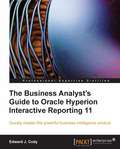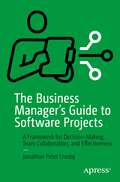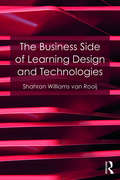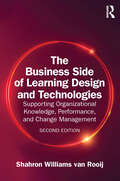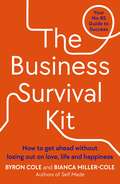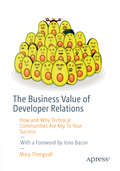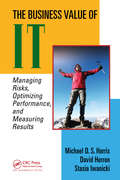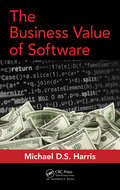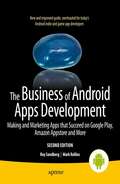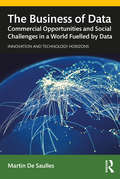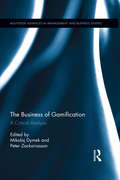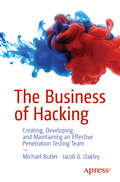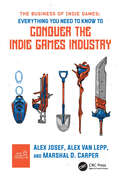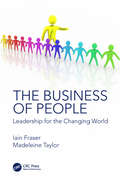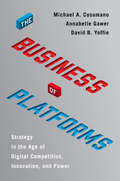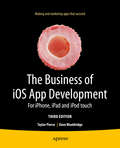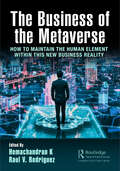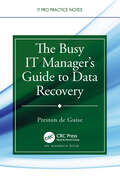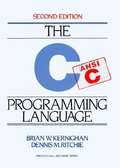- Table View
- List View
The Bridgerton Paradox in Artificial Intelligence: Balancing Diversity, Authenticity, and Responsible Innovation
by Somendra NarayanThe term 'Bridgerton Paradox' is inspired by the Netflix series 'Bridgerton', which depicts a racially inclusive elite society in Regency-era England, challenging traditional historical accuracy in favor of modern tastes and sensibilities. This creative choice mirrors the broader ethical and methodological challenges faced by AI technologies, which must navigate the delicate interplay between contemporary values of diversity and the preservation of historical contexts. This book offers a critical and forward-thinking examination of the interplay between diversity and historical authenticity in AI within the organisational setting. It provides a robust theoretical foundation, practical guidelines, and real-world examples, guiding the development of AI strategies that are both innovative and ethically sound. It will be of great interest to scholars and students of AI in business and society, diversity and inclusion and innovation strategy, as well as practitioners and policymakers seeking a nuanced opinion on the interplay of diversity and AI technologies.
The Browser Hacker's Handbook
by Wade Alcorn Christian Frichot Michele OrruHackers exploit browser vulnerabilities to attack deep within networks The Browser Hacker's Handbook gives a practical understanding of hacking the everyday web browser and using it as a beachhead to launch further attacks deep into corporate networks. Written by a team of highly experienced computer security experts, the handbook provides hands-on tutorials exploring a range of current attack methods. The web browser has become the most popular and widely used computer "program" in the world. As the gateway to the Internet, it is part of the storefront to any business that operates online, but it is also one of the most vulnerable entry points of any system. With attacks on the rise, companies are increasingly employing browser-hardening techniques to protect the unique vulnerabilities inherent in all currently used browsers. The Browser Hacker's Handbook thoroughly covers complex security issues and explores relevant topics such as: Bypassing the Same Origin Policy ARP spoofing, social engineering, and phishing to access browsers DNS tunneling, attacking web applications, and proxying-all from the browser Exploiting the browser and its ecosystem (plugins and extensions) Cross-origin attacks, including Inter-protocol Communication and Exploitation The Browser Hacker's Handbook is written with a professional security engagement in mind. Leveraging browsers as pivot points into a target's network should form an integral component into any social engineering or red-team security assessment. This handbook provides a complete methodology to understand and structure your next browser penetration test.
The Bug: A Novel
by Ellen UllmanIn 1984, at the dawn of the PC era, tester Roberta Walton stumbles across a bug. She and the coder believe it's an ordinary bug, but no matter how hard they try, they can't find its cause.
The Building as Screen: A History, Theory, and Practice of Massive Media (MediaMatters)
by Dave ColangeloThe Building as Screen: A History, Theory, and Practice of Massive Media describes, historicizes, theorizes, and creatively deploys massive media -- a set of techno-social assemblages and practices that include large outdoor projections, programmable architectural façades, and urban screens -- in order to better understand their critical and creative potential. Massive media is named as such not only because of the size and subsequent visibility of this phenomenon but also for its characteristic networks and interactive screen and cinema-like qualities. Examples include the programmable lighting of the Empire State Building and the interactive projections of Montreal's Quartier des spectacles, as well as a number of works created by the author himself. This book argues that massive media enables and necessitates the development of new practices of expanded cinema, public data visualization, and installation art and curation that blend the logics of urban space, monumentality, and the public sphere with the aesthetics and affordances of digital information and the moving image.
The Bumblebee and the Ram
by Barry RudnerA character-building story humorously presented. A bumblebee who--by laws of physics--should not be able to fly is fixed for flight by Ram, the computer, only to find that he never had to change at all in order to fly.
The Burden of Choice: Recommendations, Subversion, and Algorithmic Culture
by Jonathan CohnThe Burden of Choice examines how recommendations for products, media, news, romantic partners, and even cosmetic surgery operations are produced and experienced online. Fundamentally concerned with how the recommendation has come to serve as a form of control that frames a contemporary American as heteronormative, white, and well off, this book asserts that the industries that use these automated recommendations tend to ignore and obscure all other identities in the service of making the type of affluence they are selling appear commonplace. Focusing on the period from the mid-1990s to approximately 2010 (while this technology was still novel), Jonathan Cohn argues that automated recommendations and algorithms are far from natural, neutral, or benevolent. Instead, they shape and are shaped by changing conceptions of gender, sexuality, race, and class. With its cultural studies and humanities-driven methodologies focused on close readings, historical research, and qualitative analysis, The Burden of Choice models a promising avenue for the study of algorithms and culture.
The Business Analyst's Guide to Oracle Hyperion Interactive Reporting 11
by Edward J. CodyThis is a hands-on walkthrough, from gathering information to creating a report to the presentation sections. It helps you to get accustomed to the software and gives an in-depth understanding of how to easily unleash the powerful functionality of the software. As a result you will be able to use the powerful functionalities of Oracle Hyperion Interactive Reporting 11 to drive important business decisions. The style of the book allows you to use it as a guide to walk through each chapter or as reference material while you work with the software. This book is for all Oracle Hyperion Interactive reporting users from novice to advanced. If you find yourself struggling while using this tool or you are new to the tool, this book will guide you through and make the learning process incremental.
The Business Manager's Guide to Software Projects: A Framework for Decision-Making, Team Collaboration, and Effectiveness
by Jonathan Peter CrosbyEvery day, successful software projects scale and sustain businesses of all sizes and across all industries. Unfortunately, the reality is that many software projects still fail. The reasons behind these failures are seldom due to the underlying technology. Misunderstandings and communication barriers lead to wrong decisions, missed opportunities, communication breakdowns, or worse—huge economic loss. In this digitally connected world, business professionals can’t afford to be hands-off on technical projects, but they also can’t be expected to have technical certifications. They have first-hand knowledge of the business processes, are subject matter experts in software requirements, and they finance the projects. Even C-level management or board members need to rapidly gain just enough understanding of technology to make mission-critical decisions for businesses to survive and flourish. In most software projects the number of non-technical stakeholders far exceeds the number of techies. This book distills the world of software projects into simple terms and relatable metaphors for even the most technically adverse reader. Real-life examples, entertaining analogies, and hand-drawn illustrations will stick with readers throughout their own software projects, bolstering their success. Business requirements, use cases, process flows—the list goes on. It’s all broken down in this game-changing book aimed at delivering for business and tech teams what DevOps has done for developers and operations. What You Will Learn Know the importance of good business requirements and how to write themIdentify the most important business roles, key decisions, and critical activities involved in software projectsStrengthen collaboration between non-technical and technical teamsGrasp common software project terminology, required for non-techies Understand the software development life cycleGain insight on the common software project methodologies and how they differUnderstand what software developers do at a high level Who This Book Is ForNon-technical business professionals (such as small business owners, startup founders, or employees of a business of any size or industry) who need to secure and implement a software solution. The reader may supervise or collaborate with technical teams, and may be a (beginning) software developer looking for practical insights and better ways to communicate with business colleagues.
The Business Side of Learning Design and Technologies
by Shahron Williams van RooijThe Business Side of Learning Design and Technologies provides a ready reference with actionable tools and techniques for recognizing the impact of learning design/technology decisions at the project, business unit, and organizational levels. Written for early- and mid-career learning designers and developers as well as students and researchers in instructional/learning design and technology programs, this volume focuses on the business issues underlying the selection, design, implementation, and evaluation of learning opportunities. Using scholarly and practitioner research, interviews with Learning and Development thought leaders, and the author’s own experience, readers will learn how to speak the language of business to demonstrate the value of learning design and technologies.
The Business Side of Learning Design and Technologies: Supporting Organizational Knowledge, Performance, and Change Management
by Shahron Williams van RooijThe Business Side of Learning Design and Technologies provides actionable tools and techniques for recognizing the impact of learning design/technology decisions at the project, business unit, and organizational levels. With a focus on aligning learning initiatives with organizational objectives, the book equips early- and mid-career learning designers with essential skills in applying business strategy, artificial intelligence, data analytics, and change management to the selection, design, implementation, and evaluation of learning opportunities. This thoroughly revised second edition further emphasizes the designer as change agent, addresses the rise of remote and hybrid workplaces, adds fresh perspectives on automated and generative systems, and updates its resources, references, and interviews. Grounded in scholarly and practitioner research, systematic literature reviews, interviews with learning and development thought leaders, and real-world experience, this book provides actionable strategies for career advancement in a dynamic labor market.
The Business Survival Kit: How to get ahead without losing out on love, life and happiness
by Bianca Miller-Cole Byron Cole***SUNDAY TIMES BESTSELLER***With straightforward, heart-felt advice, The Business Survival Kit guides you to a thriving business while nurturing your humanity -- Marie Forleo, #1 NY Times bestselling author of Everything is Figureoutable This book will help you make clearer, smarter, braver decisions in all areas of your life -- Emma Gannon, author of The Multi-Hyphen MethodStarting a business isn't easy. In fact, it can be scary, exhausting and demoralising. When it finally takes off, even though you're fulfilling a lifelong dream, it can be a struggle to keep up with the rest of your life. How can you cope with the inevitable stresses and strains along the way?In The Business Survival Kit, serial entrepreneurs Byron Cole and Bianca Miller-Cole prepare you for the ride of your life. With straight-talking advice and insights from leading experts it will help you answer the fundamental question of whether you can handle being an entrepreneur in the first place and then help you navigate the inevitable ups and many downs that go hand in hand with that decision. Learn how to: *Cope with stress, anxiety and uncertainty*Build your confidence and tackle impostor syndrome *Maintain a healthy work/life balance*Build strong networks and nurture your personal relationships *And stay motivated (even in the midst of failure)
The Business Value of Developer Relations: How and Why Technical Communities Are Key To Your Success
by Mary ThengvallDiscover the true value of Developer Relations as you learn to build and maintain positive relationships with your developer community. Use the principles laid out in this book to walk through your company goals and discover how you can formulate a plan tailored to your specific needs.First you will understand the value of a technical community: why you need to foster a community and how to do it. Then you will learn how to be involved in community building on a daily basis: finding the right audience, walking the tightrope between representing the company and building a personal brand, in-person events, and more.Featuring interviews with Developer Relations professionals from many successful companies including Red Hat, Google, Chef, Docker, Mozilla, SparkPost, Heroku, Twilio, CoreOS, and more, and with a foreword by Jono Bacon, The Business Value of Developer Relations is the perfect book for anyone who is working in the tech industry and wants to understand where DevRel is now and how to get involved. Don’t get left behind – join the community today. What You’ll Learn Define community and sell community to your company Find, build, and engage with the community Determine how and when to hire community managersBuild your own personal brandWho This Book Is For Any business leaders/owners/stakeholders in the tech industry, tech evangelists, community managers or developer advocates.
The Business Value of IT: Managing Risks, Optimizing Performance and Measuring Results
by David Herron Michael D. Harris Stasia IwanickiIn order to maximize IT resources and justify IT expenditures, CIO's and other IT managers must be able to identify meaningful metrics and explain them in a way that management can understand. The Business Value of IT: Managing Risks, Optimizing Performance, and Measuring Results solves this problem by providing practical answers to
The Business Value of Software
by Michael D. HarrisIn business, driving value is a key strategy and typically starts at the top of an organization. In today’s digital age, driving software value is also an important, and often overlooked, key strategy. Executives, and the corporate board, need to expect the highest level of business value from the software the organization is developing, buying, and selling. In today’s digital transformation marketplace, it is imperative that organizations start driving business value from software development initiatives. <P><P>For many years, the cost of software development challenged organizations with questions such as: <P><P>How do we allocate software development costs? <P><P>Should these costs be considered an overhead expense? <P><P>Are we getting the most value possible for our investment? <P><P>A fundamental problem has been built into these questions – the focus on cost. In almost every other part of the organization, maximizing profit or, in the case of a not-for-profit, maximizing the funds available, provides a clear focus with metrics to determine success or failure. In theory, simply aligning software spending with the maximizing profit goals should be sufficient to avoid any questions about value for money. Unfortunately, this alignment hasn’t turned out to be so simple, and the questions persist, particularly at the strategic or application portfolio level. <P><P>In this book, Michael D.S. Harris describes how a software business value culture—one where all stakeholders, including technology and business—have a clear understanding of the goals and expected business value from software development. The book shows readers how they can transform software development from a cost or profit center to a business value center. Only a culture of software as a value center enables an organization to constantly maximize business value flow through software development. If your organization is starting to ask how it can change software from a cost-center to a value-center, this book is for you.
The Business of Android Apps Development: Making and Marketing Apps that Succeed on Google Play, Amazon Appstore and More
by Mark Rollins Roy SandbergThe growing but still evolving success of the Android platform has ushered in a second mobile technology "gold rush" for app developers. Google Play and Amazon Appstore for Android apps has become the second go-to apps eco for today's app developers. While not yet as large in terms of number of apps as iTunes, Google Play and Amazon Appstore have so many apps that it has become increasingly difficult for new apps to stand out in the crowd. Achieving consumer awareness and sales longevity for your Android app requires a lot of organization and some strategic planning. Written for today's Android apps developer or apps development shop, this new and improved book from Apress, The Business of Android Apps Development, Second Edition, tells you today's story on how to make money on Android apps. This book shows you how to take your app from idea to design to development to distribution and marketing your app on Google Play or Amazon Appstore. This book takes you step-by-step through cost-effective marketing, public relations and sales techniques that have proven successful for professional Android app creators and indie shops-perfect for independent developers on shoestring budgets. It even shows you how to get interest from venture capitalists and how they view a successful app vs. the majority of so-so to unsuccessful apps in Android. No prior business knowledge is required. This is the book you wish you had read before you launched your first app!
The Business of Data: Commercial Opportunities and Social Challenges in a World Fuelled by Data (Innovation and Technology Horizons)
by Martin De SaullesThis book is about the rise of data as a driver of innovation and economic growth. It charts the evolution of business data as a valuable resource and explores some of the key business, economic and social issues surrounding the data-driven revolution we are currently going through. Readers will gain an understanding of the historical underpinnings of the data business and why the collection and use of data has been driven by commercial needs. Readers will also gain insights into the rise of the modern data-driven technology giants, their business models and the reasons for their success. Alongside this, some of the key social issues including privacy are considered and the challenges these pose to policymakers and regulators. Finally, the impact of pervasive computing and the Internet of Things (IoT) is explored in the context of the new sources of data that are being generated. This book is useful for students and practitioners wanting to better understand the origins and drivers of the current technological revolution and the key role that data plays in innovation and business success.
The Business of Gamification: A Critical Analysis (Routledge Advances in Management and Business Studies)
by Peter Zackariasson Mikolaj DymekAt the turn of the century the term "gamification" was introduced as a concept to understand the process of using game mechanics in "non-game" contexts. The impact of gamification was soon evident to business practices where it had impact both on marketing and, more broadly, on the organizations themselves. As the number of individuals playing video games grows, there seem to be an acceptance of game mechanics elsewhere. Its effectiveness is highly dependent on both technical possibilities and cultural acceptance, two factors present today. The aim of The Business of Gamification is to critically analyze the practical and theoretical consequences of gamification. Practically, how has gamification been applied in businesses to this point, and what are the future scenarios? Theoretically, what are the contributions of gamification to existing academic knowledge? How does this change our understanding of how business are performing and its consequences, for organizations, consumers, and society in general? This edited volume contains new, and stringent, perspectives on how gamification is contextualized in business settings, both in theory as well as in practice. This book will provide a wealth of research for individuals seriously interested in the industry at the academic level. As a result, this book will serve as a reference in curricula associated with video game development for years to come.
The Business of Hacking: Creating, Developing, and Maintaining an Effective Penetration Testing Team
by Michael Butler Jacob G. OakleyThere is a plethora of literature on the topic of penetration testing, hacking, and related fields. These books are almost exclusively concerned with the technical execution of penetration testing and occasionally the thought process of the penetration tester themselves. There is little to no literature on the unique challenges presented by creating, developing, and managing a penetration testing team that is both effective and scalable. In addition, there is little to no literature on the subject of developing contractual client relationships, marketing, finding and developing talent, and how to drive penetration test execution to achieve client needs. This book changes all that.The Business of Hacking is a one-of-a-kind book detailing the lessons the authors learned while building penetrating testing teams from the ground up, making them profitable, and constructing management principles that ensure team scalability. You will discover both the challenges you face as you develop your team of offensive security professionals and an understanding of how to overcome them. You will gain an understanding of the client’s requirements, how to meet them, and how to surpass them to provide clients with a uniquely professional experience. The authors have spent combined decades working in various aspects of cybersecurity with a focus on offensive cybersecurity. Their experience spans military, government, and commercial industries with most of that time spent in senior leadership positions. What you’ll learn How to handle and ongoing develop client relationships in a high end industryTeam management and how the offensive security industry comes with its own unique challenges. Experience in other industries does not guarantee success in penetration testing.How to identify, understand, and over-deliver on client expectations.How to staff and develop talent within the team.Marketing opportunities and how to use the pentesting team as a wedge for upsell opportunities.The various structures of services available that they may present to their clients. Who This Book Is For This book is written for anyone curious who is interested in creating a penetration testing team or business. It is also relevant for anyone currently executing such a business and even for those simply participating in the business.
The Business of Indie Games: Everything You Need to Know to Conquer the Indie Games Industry
by Alex Josef Alex Van Lepp Marshal D. Carper"The Business of Indie Games provides exceptional insight into how the video games industry works. It shares valuable information on how to successfully self-publish and secure publisher support. Whether you’re making your first game or tenth, this book is a must read." – Paul Baldwin, Curve Digital "The video game industry is a tough business and anyone looking to succeed in indie development should give The Business of Indie Games a read." – Graham Smith, Co-Founder of DrinkBox Studios "This book is a fast track to success for anyone managing a game launch and looking to raise funding for their projects. It shares knowledge that you only learn after years of triumphs and failures within this industry." – Scott Drader, Co-Founder of Metalhead Software "There’s nothing like The Business of Indie Games taught in school. You learn how to make a game, but not how to conduct business, market, and launch a game. This book dives into topics that every indie developer should know." – Yukon Wainczak, Founder of Snoozy Kazoo "I’ve seen no better guide for understanding how the video game industry really works. An important read for anyone whose work touches games, including those of us looking to engage the community." – Carla Warner, Director of STREAM for No Kid Hungry The Business of Indie Games explores what many universities forget to cover: how to sell and market your own indie game to potential publishers and developers. While many classes help students on their way to designing and programming their own games, there are few classes that equip students with the skills to sell their own product. In essence, this means future indie game developers are not equipped to talk to investors, negotiate with publishers, and engage with major platforms like Steam and Nintendo. Authors Alex Josef, Alex Van Lepp, and Marshal D. Carper are looking to rectify this problem by helping indie game developers and companies level up their business acumen. With detailed chapters and sections that deal with different engines, negotiation tactics, and marketing, The Business of Indie Games is the perfect omnibus for up-and-coming indie game developers. The future of gaming curriculums is not just in teaching students how to create games but also in preparing them for the business of games.
The Business of People: Leadership for the Changing World
by Madeleine Taylor Iain FraserThe Business of People is purposefully focused on people. The book will assist you to develop and support yourself with your people leadership, knowledge, and skills. It is an opportunity to better manage yourself and lead others, including your organization, into the modern volatile, uncertain, complex, and ambiguous (VUCA) world. It is also a sequel to the top-selling book The Business of Portfolio Management: Boosting Organizational Value. Authors Madeleine Taylor and Iain Fraser combine to give you the very best in knowledge and experience in a variety of situations. This is a book that cuts through the nonsense and presents real-world solutions for situations facing leaders today and tomorrow. Shifting from managing people to leading people requires a pivot...Leadership matters because the future is at greater risk without it. Regardless of where you are in your leadership journey I am confident this new book from Madeleine and Iain will be a valuable resource for you. Enjoy the journey, it never ends. —Mark A. Langley, Former President and CEO, Project Management Institute Iain and Madeleine are honest and raw about the challenges faced, and the resiliency needed, to lead in business. —Suzanne M. O’Gorman, Senior Strategic Business Architect, United Healthcare Group In a world where leadership increasingly requires emotional and cultural intelligence skills, this masterpiece couldn’t be any timelier. —Dr. Hilary Aza, Senior Portfolio Manager, Tarrant County, Texas Essential for anyone seeking to better understand their personal leadership and to inform further development. —Rob Loader, Executive, Capital Planning & Delivery, Telstra Corporation The book to me is written from a position of empowerment, cultural acknowledgment, hopefulness, and purpose.—Elissa Farrow, Founder, About Your Transition This book will challenge your own thinking and behaviour and give you an opportunity to develop your adaptability and leadership style for an evolving future. —Thomas Davis, GM, Corporate Services, Capital & Coast District Health Board, New Zealand
The Business of Platforms: Strategy in the Age of Digital Competition, Innovation, and Power
by David B. Yoffie Michael A. Cusumano Annabelle GawerA trio of experts on high-tech business strategy and innovation reveal the principles that have made platform businesses the most valuable firms in the world and the first trillion-dollar companies. Managers and entrepreneurs in the digital era must learn to live in two worlds—the conventional economy and the platform economy. Platforms that operate for business purposes usually exist at the level of an industry or ecosystem, bringing together individuals and organizations so they can innovate and interact in ways not otherwise possible. Platforms create economic value far beyond what we see in conventional companies.The Business of Platforms is an invaluable, in-depth look at platform strategy and digital innovation. Cusumano, Gawer, and Yoffie address how a small number of companies have come to exert extraordinary influence over every dimension of our personal, professional, and political lives. They explain how these new entities differ from the powerful corporations of the past. They also question whether there are limits to the market dominance and expansion of these digital juggernauts. Finally, they discuss the role governments should play in rethinking data privacy laws, antitrust, and other regulations that could reign in abuses from these powerful businesses. Their goal is to help managers and entrepreneurs build platform businesses that can stand the test of time and win their share of battles with both digital and conventional competitors. As experts who have studied and worked with these firms for some thirty years, this book is the most authoritative and timely investigation yet of the powerful economic and technological forces that make platform businesses, from Amazon and Apple to Microsoft, Facebook, and Google—all dominant players in shaping the global economy, the future of work, and the political world we now face.
The Business of iOS App Development
by Taylor Pierce Dave WooldridgeUpdated and expanded for the new Apple iOS8, The Business of iOS App Development, Third Edition shows you how to incorporate marketing and business savvy into every aspect of the design and development process, giving your app the best possible chance of succeeding in the App Store. This book is written by experienced developers with business backgrounds, taking you step-by-step through cost-effective marketing techniques that have proven successful for professional iOS app creators--perfect for independent developers on shoestring budgets. No prior business knowledge is required. The phenomenal success of the iPhone, iPad and the iPod touch have ushered in a "gold rush" for developers, but with well over a million apps in the highly competitive App Store, it has become increasingly difficult for new apps to stand out in the crowd. Achieving consumer awareness and sales longevity for your iOS app requires a lot of organization and some strategic planning. This is the book you wish you had read before you launched your first app! What you'll learn Analyze your ideas and competition, and identify your audience to evaluate sales potential Protect your business and intellectual property and avoid potential legal hassles Transform your iOS app into a powerful marketing tool. Build synergy with in-app cross-promotion and social media, and Apple's Game Center Utilize revenue-generating business models such as in-app advertising and In-App Purchase; includes extensive coverage of the iAd framework and the Store Kit API Improve usability and implement effective testing Create a pre-release buzz online with Twitter, Facebook, blogs, and a dedicated website Successfully navigate the App Store submission process Execute a post-release marketing strategy with press releases, app reviews, promotional sales and giveaways Who this book is for This book is for any developer looking to build a successful business selling iPhone, iPod touch, and iPad apps in Apple's iTunes App Store. All the code examples included in this book can be downloaded from http://iphonebusinessbook. com/. Table of Contents Seeing the Big Picture in a Crowded App Store Market Place Doing Your Homework: Analyzing iOS App Ideas and Performing Competitive Research Protecting Your Intellectual Property Your iOS App Is Your Most Powerful Marketing Tool Social Inception: Promoting Your Apps Within Apps Money for Nothing: When It Pays to Be Free Monetizing Free Apps with iAd and Other In-App Advertising Opportunities Exploring the Freemium Model with In-App Purchase Testing and Usability: Putting Your Best Foot Forward Get the Party Started! Creating a Prerelease Buzz Keys to the Kingdom: The App Store Submission Process Increasing Awareness for Your iOS App
The Business of the Metaverse: How to Maintain the Human Element Within this New Business Reality
by Raul V. Rodriguez K. HemachandranThe metaverse is the future of business applications and models, and this ground-breaking book points and details a complete and clear picture of how the metaverse can impact the various business segments and how the human element will be maintained within the evolutionary change. This book serves as a guide for those planning to implement and expand the metaverse in their business as well as those already using it on limited levels. Simulated intelligence innovation can reveal intricate and significant examples in robust and information-rich situations that posture difficulties for human insight. In addition, similar to other burgeoning advancements, the experience and aptitudes accumulated by vendors and consumers, alongside the steady analysis of interactions and information, empower metaverse calculations to be refined and improved. This book illustrates the current advancements and results and expands the analysis of human-centric metaverse applications to business segments and their future effects on overall enterprise management. Essentially, this book elaborates on the impact of the metaverse across business sectors through the use of case studies.
The Busy IT Manager’s Guide to Data Recovery (IT Pro Practice Notes)
by Preston de GuiseNo IT manager or worker enjoys being woken up the middle of the night over a system fault. But arguably the worst way to be awakened is over a situation where data loss has occurred – and the recovery is going wrong. The Busy IT Manager’s Guide to Data Recovery takes a razor focus on the details IT managers (and their teams) responsible for data recovery and resiliency within their business need to be aware of in the design of robust data protection systems. This book covers key architectural requirements of a data resilient system and the types of technology a business can deploy for data protection that maximises the potential for a successful recovery. With cyber-attacks being a daily challenge for IT and business now, the book also takes an in-depth look at the special considerations companies need to take in order to guarantee the recoverability of data after a destructive cyber event. Regardless of whether your IT infrastructure runs on-premises or in the public cloud, this book gives you the information you need to plan and run a successful data recovery solution that meets your business needs. Preston de Guise has been working with data recovery products for his entire career – designing, implementing, and supporting solutions for governments, universities, and businesses ranging from SMEs to Fortune 500 companies. This broad exposure to industry verticals and business sizes has enabled Preston to understand not only the technical requirements of data protection and recovery, but the management and procedural aspects too.
The C Programming Language (Second Edition)
by Brian Kernighan Dennis RitchieIntroduces the features of the C programming language, discusses data types, variables, operators, control flow, functions, pointers, arrays, and structures, and looks at the UNIX system interface.
